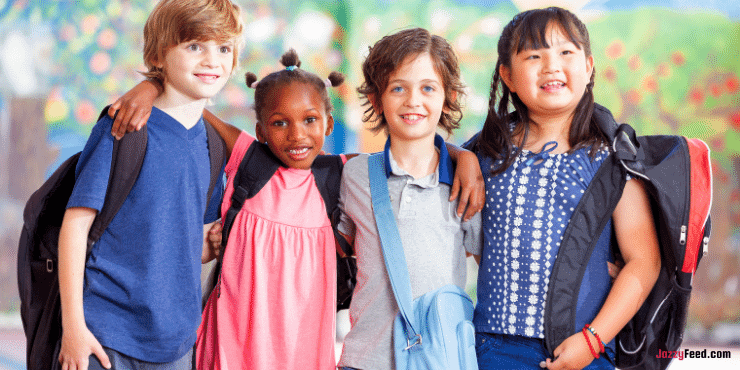As much as we all want to get back to “normal” as more individuals get their COVD-19 vaccination doses (or doses) and schools around the country open, a recent poll shows that the majority of students are more apprehensive than happy about returning to their classes in the autumn.
Recognize their Concerns
“Parents should not dismiss their children’s concerns by stating, ‘You have nothing to worry about,’ and then closing the book,” Dr. Hafeez advises. “It’s critical to figure out what makes your child anxious so you can have a conversation and begin troubleshooting and problem-solving with your teen before school starts.”
This way, she says, you can work on coping methods with your child, which could include enlisting the help of a school counselor, a tutor, a trusted sports coach, or a parent of a close friend.
“It’s also vital to remind your child that they’re not alone in their feelings and that many teens put on a brave face while experiencing the same fear and anxiety.”
Remind your child that emotions might shift at any time.
According to Amani Edwards, it’s critical to educate your children that large life changes often take six months to acclimate to, and that “returning to school is an example of this.” Students who adjusted well at the outset of the pandemic can be reminded that their current concerns and frustrations can be handled similarly with an optimistic and motivated mindset.”
She also recommends reminding your youngster that feelings come and go like waves. “Assisting the youngster in recalling a time when they overcame challenging emotions may be beneficial. Remind them to check-in at the six-month mark to keep track of their development and to be more aware of their improved moods.”
Instill Self-assurance
Instilling confidence in your child as they begin to feel more like their best self before the school year begins could be a terrific method to assist them with their readjustment.
Dr. Hafeez advises, “Remind your child what they are good at and get them back involved in that over the summer months.” “The pandemic made it difficult to engage in daily activities and socialize. Get your youngster back on the tennis court if they are a superb player. If they have a natural talent for painting, encourage them to enroll in a painting class. To come back to being themselves, people need to re-establish their place in the world, a sense of belonging, and who they were before the pandemic.”
While some children may be hesitant at first because they are afraid of “not being good at anything anymore,” she suggests allowing them to “take baby steps back into their hobbies in low-pressure environments at first until they recover their footing.”
Assist your Youngster in Identifying their Triggers
Amani Edwards suggests assisting them in identifying their problems and providing them with simple tools to track their improvement. She recommends that worried youngsters learn more about what causes their anxiety.
“They can then react to the circumstance and adopt a coping strategy to deal with their strong emotions. Deep breathing, mood trackers, and mindfulness meditation are examples of tools that can help students be present and nonjudgmental in situations that have previously caused substantial distress.”
She proposes a worksheet for kids who are depressed that monitors their activity development, starting with small, low-energy tasks, progressing to a medium-energy activity, and then building up to more challenging activities. “In this manner, kids begin slowly, then grow as they gain confidence and engage in activities that are both important and enjoyable.”
Encourage your Kids to Socialise Once More
Relationships in real life are awkward for everyone, but they’re even more so for your child (who probably feels awkward at the best of times). Encourage your children to socialize more by gently encouraging them to do so. This will help them restore their social confidence and comfort. “For preschoolers and grade-schoolers, it’s about moving them away from the screen, such as Minecraft, video games, and phones, and back to playing with their friends and re-entering socialization,” adds Dr. Hafeez. “Relearning to share, going on a playdate away from parents, strengthening motor skills, expanding attention span, and social development in general.”
She advises parents to urge their high school students to seek out activities and people that are inside their comfort zone in order to restore their social “sea legs.”
“Parents can then gently nudge the adolescent to do new activities or interact with people who are outside of their comfort zone. Start with something your teen excels at and has had previous success with. You want them to have a great experience so that they would be motivated to get more involved and fully immerse themselves in their pre-pandemic lives.”
Consider whether or whether your child should seek outside assistance, such as therapy.
If a child is experiencing mood swings, anxiety, using drugs or alcohol, experiencing changes in appetite, sleep patterns, lack of socialization, apathy, and/or not fulfilling assignments or obligations after about a month of school, according to Dr. Hafeez, it is time to seek the help of a therapist.
“It is time to reach out for professional support when the child’s symptoms are preventing him or her from working or going to school, if there is increased conflict and difficulty in relationships, increased risk of health issues if the child has been hospitalized for mental health concerns or is contemplating suicide,” Amani Edwards adds.

